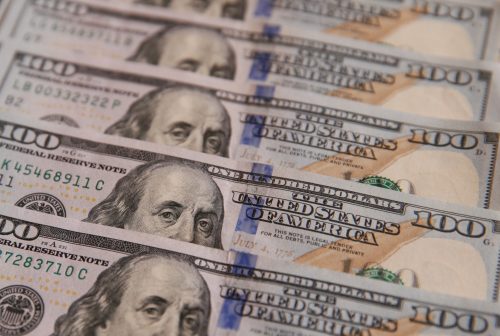
Some alarmist warnings never seem to go away no matter how often they prove mistaken.
One is that the US dollar is bound to lose its position soon as the world’s dominant international reserve currency, with all the benefits such status affords the US economy.
Judging by a chorus of dollar pessimists including Yale’s Stephen Roach and former Morgan Stanley economist Stephen Jen, it seems the idea the dollar will be dethroned is back in vogue.
Even Brazil’s President Luiz Inácio Lula da Silva says, “Every night I ask myself: Why should every country have to be tied to the US dollar for trade?’’
Despite many such warnings over the past two decades, the US dollar remains by far the top dog amongst the world’s currencies.
While the dollar has lost some share in the past decade, the International Monetary Fund says the world’s central banks still hold close to 60% of their international reserves in dollars.
Meanwhile, per the Bank for International Settlements, almost 90% of international trade continues to be transacted in dollars.
Several factors are prompting the latest round of dollar doom-mongering. Among these are the recent fears about US regional banks’ health in the wake of the Silicon Valley Bank and Signature Bank failures.
Also causing dollar angst is the looming debt-ceiling showdown that’s raising the specter of a US debt default, the growing worry of some central banks that America is weaponizing the dollar as underlined by its Iranian and Russian sanctions and the Federal Reserve’s recent policy mismanagement that spawned the highest US inflation in 40 years.
Before working ourselves into a lather about the dollar’s imminent eclipse, it is well to recall Paul Volcker’s observations on previous occasions the dollar’s continued dominance was questioned.
Volcker noted that for the dollar to be replaced as the world’s leading currency, it had to be replaced by another currency.
With all the dollar’s apparent weaknesses, were the euro, the Chinese renminbi and the Japanese yen really more stable currencies?
Volcker’s skepticism about the world’s other major currencies’ ability to knock the US dollar from its lofty perch are as pertinent today as they were at the century’s start.
Take the euro, the world’s second-most-important currency.
Never before has the eurozone’s economic periphery, including most notably Italy, been as indebted as it is today. Never since the eurozone’s 1999 launch has its inflation been as high as it is today.
This has to raise the prospect of another round of eurozone sovereign-debt crisis as the European Central Bank has been forced to slam on the monetary brakes and switch from a policy of massive bond buying to one of balance-sheet reduction.
Any such crisis would summon serious questions about the euro’s long-term viability, especially given that a new round of eurozone sovereign-debt crisis would be centered on Italy, whose economy is some 10 times the size of Greece’s.
China’s long-term prospects of replacing the dollar as the world’s top currency seem even dimmer.
Over the past decade, China experienced a property and credit market bubble that exceeded the ones that preceded Japan’s lost economic decade in the 1990s and the US housing and credit-market bubble that preceded the 2008-2009 Great Recession.
This has given rise to a year of declining housing prices and a wave of defaults by Chinese property developers, including most notably Evergrande.
Compounding China’s economic woes was President Xi Jinping’s economically disastrous zero-COVID policy that last year caused the second-slowest growth in half a century.
Any chance the Chinese currency will become fully convertible any time soon is highly remote now that we have the clearest of signs its bubble has started to deflate and its economy is on a low-growth trajectory.
All this is not to say the US dollar’s position as the world’s dominant currency is impregnable and US policymakers do not need to pursue sounder economic policies than they have been to ensure the dollar’s long-run enviable status.
After all, until World War II, the pound sterling was the world’s dominant currency — only to be eclipsed by the US dollar.
But it is to say that with the world’s other major currencies in such a sorry state, there is little risk we will see the dollar’s sudden demise.
There is also every prospect that in the event of a global recession later this year, the dollar will receive a strong bid as investors flee to safety.



